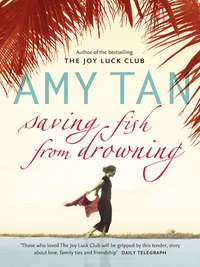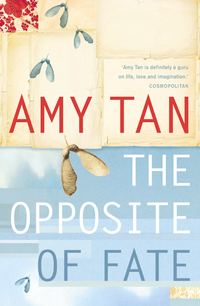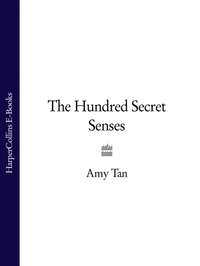
Полная версия
The Valley of Amazement
“They were her favorite, too?”
“She despised them and complained that I was growing weeds.” She laughed and seemed not to notice my dismay. “Once you step inside the house, you’re in the vestibule. On one side is a staircase, like the one we have here, but a bit smaller. And on the other side is a thick toffee-colored curtain on a brass rod, not as wide as what we have here. Step through the curtain and you are in the parlor. The furniture is likely old-fashioned, what my grandmother placed there. Through a large doorway, you enter the dining room—”
“Where will I sleep?”
“You’ll have a large lovely bedroom on the second floor, with sunny yellow walls. It was my room.”
Her room. I was so happy I wanted to shout. Outwardly, I showed little.
“There is a tall bed next to large windows. One window is next to an old oak tree and you can open the window and pretend you’re a scrub jay in the branches—those are the noisy birds I remember—they hopped right up to me for a peanut. There are plenty of other birds, herons, hawks, and singing robins. You can look them up in the ornithology books my mother collected. Your grandmother’s father was a botanist and a naturalist illustrator. I also have a nice collection of dolls, not the babyish kind you push in a pram. They’re prettily painted. And throughout the house are walls of books, top to bottom. You’ll have enough to read for the rest of your life, even if you consumed two books a day. You can take your books up to the round turret to read. As a girl, I decorated it with shawls and hassocks and Persian carpets to look like a seraglio. I called it Pasha Palace. Or you can look out the windows through a telescope and see clear to the waterfront and the Bay, to the islands—there are several—and you can count the schooners and fishing boats …”
She chattered on, her recollections blossoming. I could see the house in the stereopticon of my mind, a place that took on color and the movement of life. I was dazzled by the thought of room after room with walls of books, of a bedroom with a window next to an oak tree.
My mother was now busy removing her jewelry cases from a locked cupboard. She had at least a dozen each of necklaces, bracelets, brooches, and pins—gifts she had received over the years. She had sold most of the jewelry, and the ones she kept were her favorites, the most valuable. She placed all the cases in her valise. Were we not coming back?
“Once you find Teddy, will he return to Shanghai with us?”
Again, there was an awkward pause. “I don’t know. I cannot predict what will happen. Shanghai has changed.”
A terrible thought sprang to mind. “Mother, will Carlotta come with us?”
She immediately busied herself with hatboxes, so I knew already the answer. “I won’t leave without her.”
“You would stay behind for a cat?”
“I refuse to go if I cannot bring her.”
“Come now, Violet. Would you cast away your future for a cat?”
“I would. I am nearly grown up and can choose for myself,” I said rashly.
All affection left her face. “All right. Stay if you like.”
I had been foiled. “How can you ask me to choose?” I said in a cracked voice. “Carlotta is my baby. She is to me what Teddy is to you. I cannot leave her behind. I cannot betray her. She trusts me.”
“I am not asking you to choose, Violet. There is no choice. We must leave, and Carlotta cannot come. We cannot change the rules of the ship. What you must think instead is that we may indeed return. Once we are in San Francisco, I will then know better what to do. But not until then …”
She continued her explanation, but grief had already set in. My throat knotted up. I could not explain to Carlotta why I was leaving.
“While we’re gone,” I heard my mother say through my haze of misery, “Golden Dove can take care of her.”
“Golden Dove is scared of her. No one loves Carlotta.”
“The daughter of Snowy Cloud’s attendant—Little Ocean—she loves her dearly. She will be happy to care for her, especially if we give her a little money to do so while we are gone.”
This was true. But my worries remained. What if Carlotta loved the little girl more than she did me? She might forget me and would not care if I ever returned. I fell into a tragic mood.
Although my mother had limited me to four dresses, she was quickly becoming more generous with her own allotment. She decided the two steamer trunks she had were not large enough, and because of their rounded tops they could not be stacked, which would limit what she could bring. Also, they were old, what she had brought from San Francisco. She called for Golden Dove to buy four new steamer trunks, larger ones. “Mr. Malakar told me last month that he had smuggled in a large shipment of Louis Vuitton trunks from France to Bombay. They’re the flat-topped ones I want. I also need two steamer bags, the small ones. And tell him he better not think I won’t know if he slips me the counterfeit …”
She threw her choice of gowns onto the bed. She was bringing so many, I figured she would attend balls as soon as she stepped off the boat. But then she called in Golden Dove and told her to be honest in saying which dresses were more flattering, which brought out the color of her eyes, her complexion, and her mahogany brown hair, and which of these would American women envy, and which would cause them to think she was an immoral woman.
Golden Dove disapproved of all her choices. “You designed those dresses to be shocking and to lure men to your side. And all the American women I’ve seen staring at you in the park were hardly clapping with admiration.”
Instead of having to choose, Mother took most of her evening gowns, as well as her newer dresses, coats, and hats. My four dresses dwindled to the two I would wear during our journey. She promised that many beautiful frocks awaited me, better than those I now owned. My favorite books were not necessary to bring either, nor were my schoolbooks, since those could be easily replaced with better ones in San Francisco, where I would also have better tutors than the ones here in Shanghai. I should simply enjoy a little holiday from study on our voyage.
Into my valise, she placed a maroon box with my jewelry, two other boxes she retrieved from a drawer, two scrolls wrapped in silk, and a few other valuables. On top of this, she placed her fox fur wrap, believing, I suppose, she might need a bit of glamour as we stood on deck and watched Shanghai recede from view.
At last we were done. Mother now needed only to find from among her coterie of influential foreigners someone to buy us passage to America. She gave Cracked Egg a dozen letters to deliver.
A day went by, then a week. The werefox eyes left and her old self returned, the one that was agitated and snappish. She gave Cracked Egg another packet of letters. Two berths, that was all we needed. What was so difficult about that? Every message came back the same: Her American compatriots were also anxious to leave Shanghai, and they, too, had found that others before them had grabbed every berth on ships for the next month.
During our wait I showed Little Ocean how to make a nest of my silk quilts for Carlotta. Ocean was eight, and as she petted Carlotta, she whispered to her, “I will be your obedient attendant.” Carlotta purred and rolled onto her back. My chest ached to see how happy Carlotta already was.
After eleven days of waiting, Fairweather sauntered through Mother’s bedroom door, without announcement. He had good news.
I KNOW WHY my mother had once loved Fairweather. He was adept at teasing her out of her bad moods. He was funny, a cure for worry. He made her laugh and feel beautiful. He said he adored her for all her unusual features and manners. He gave her exaggerated looks of befuddled love. He spoke of heartfelt emotions, all of them ones he claimed he had never known with any other woman. And he gave her sympathy for all her indulgent woes. He put her head on his shoulder and told her to cry until her heart was empty of poisonous grief. He shared her indignation when her clients had unfairly used knowledge she had given them in trust.
They had become friends more than nine years ago, and whatever she had needed then, he had given her. They alluded to times in her life when she had suffered a betrayal, a loss of confidence, when she had worried over money. He knew about her early success, about the death of a man who had taken her in when she first came to Shanghai. Remember, remember, remember, he said, to draw out the painful emotions of the past, so he could console her.
I hated that he treated my mother with easy familiarity. He called her “Lu,” “Lovely Lulu,” “Lullaby,” and “Luscious.” When she was peeved, he restored her humor by acting like a whipped schoolboy or an errant knight. He recited asinine jokes, and she returned laughter. He purposely embarrassed her in front of others—and in flattering and disgusting ways. At dinner, I watched him obscenely rotate his lips and tongue, claiming there was something stuck on the roof of his mouth. “Wipe that chimpanzee grin off your face,” she would say. And he would laugh long and hard, before standing up and bidding her adieu with a comic wink. He would then wait for her in her bedroom. With him, she was weak, no longer herself. She was often silly, drank too much, and laughed too hard. How could she be so stupid?
All the servants at Hidden Jade Path liked Fairweather because he greeted them in Shanghainese and he thanked them for every little thing. They were accustomed to being treated by others as if they were appendages to trays of tea. Everyone made guesses as to where Fairweather might have learned to speak their native tongue. From an amah? A courtesan? A mistress? Clearly a Chinese woman gave him his good Chinese heart. Among Chinese men, he had earned the fond title “Chinese-style foreign dignitary.” Although everyone knew his charm, there was little else known about him. Where in the United States did he hail from? Or was he indeed an American? Perhaps an American fugitive? They did not know his true name. He joked he had not used his name for so long, he had forgotten what it was. He simply went by the nickname Fairweather, which his fraternity brothers had given him years ago when he attended a nameless university he had described as “one of those hallowed halls.”
“Fair weather followed me wherever I went,” he said, “and so my dear friends welcomed me everywhere.” In Shanghai, he was invited to parties all over town, and he was the last to leave, unless he spent the night. Yet, oddly enough, no one faulted him for hosting no parties in return.
His popularity, one of the courtesans said, had to do with a skilled man who made counterfeit certificates of every kind. This clever man made visas, birth certificates, wedding certificates, and a valuable supply of documents stamped with the official consular seal, on which he had written in Chinese and English the various “herewith” and “henceforth” proclamations that the person whose name was inscribed had impressed the American consul as having “good character.” Fairweather sold them to his “special Chinese friends,” as he called them, so special he charged them five times what he paid the translator. They were happy to hand over the money. Any Chinese person, whether a businessman, courtesan, or madam, could wave his or her magic certificate of good character in any court in the International Settlement and have the Stars and Stripes defend his or her honor. No Chinese bureaucrat would have wasted his time challenging an American’s opinion, because in those courts, the Chinese would always lose. Since the certificate was good for only one year, Fairweather could assess how special his friends truly were on a regular and profitable basis.
I was the only person who did not fall for his greasy charms. I had suffered much pain seeing how my mother preferred his company to mine. And that pain enabled me to see how false he was. He used rehearsed words of concern, the same ones, the same gestures and gentlemanly offers of help. To him, people were prey easily brought down. I knew this because he tried his tricks and charm on me, even though he knew that I saw through his deceit. He sprinkled me with mocking flattery, extolling my messy hair, my bad elocution, the childish book I had chosen to read. I did not smile at him. I was curt if required to speak. My mother scolded me often for being rude to him. He simply laughed. I made it clear through my expression and stiff posture that I found him tiresome. I sighed or rolled my eyes. I did not show him my rage, because that would mean he had won. I left the gifts he brought me on the table in my mother’s office. Later, I would return to the table, and sure enough, the gifts would be gone.
Shortly after New Year’s Day, Fairweather and my mother had a falling-out. She had learned from Golden Dove that he had been sharing Puffy Cloud’s bed before and after he had been with her. My mother had made no claim to monogamy. After all, she took other lovers from time to time. But Fairweather was her favorite, and she had assumed that her lovers would not go poking a subordinate in her own house. I listened as Golden Dove told my mother the truth, preceded by this scolding remark: “I told you nine years ago that this man would use you as a fool. Lust leaves you blind long after you’ve lost your mind in bed.” Golden Dove had extracted from her maid the facts and said she would not spare Mother from hearing any of the details so that she would finally banish Fairweather from her bed. “Over the last year, he’s been filling her to the brim with so much ecstasy all the maids thought her cries were caused by a sadistic customer. They all heard. They all know—the other courtesans, maids, and menservants. They saw him slithering along the hallways. And guess how Puffy Cloud was able to earn money from him? It was money you had given him for what he had called trifling expenses and a tardy influx of money.”
Mother listened to every bit of that sickening truth. I think she felt what had wounded me so often: Someone she loved preferred another. I was glad she felt that pain. I wanted her to know what misery she had given me. I wanted her to give me the supply of love she had given to that cheat.
I had already positioned myself in Boulevard, when Fairweather arrived for his execution. I was ticklish with excitement. Mother had put on a stiff black dress, as if she were in mourning. When he arrived at noon—no doubt from Puffy Cloud’s bed—he was surprised to find she was not still asleep, but sitting in her office wearing what he deemed “an unbecoming dress.” He offered to help remove it immediately.
“Keep your little trouser friend buttoned up,” I heard her say.
I was elated that she finally expressed the same disgust I had always felt for him. She attacked his business acumen. She belittled him for being no more than a paid sycophant. She said he was a parasite who lived on unpaid loans. She could finally see him for who he was, she said, a man whose “cheap charms flowed in spurts from his little fire hose into Puffy Cloud’s eager mouth.”
He, in turn, blamed his transgressions with Puffy Cloud on an opium addiction. She had seduced him with her pipe, and nothing more than that. His time with her was as memorable as a cup of lukewarm tea. I wished Puffy Cloud could hear what he was saying. Now that he knew how wounded she was, he said, he would take the cure and be rid of both his opium habit and Puffy Cloud. My mother remained silent. I cheered. He shuffled his words, and reminded her that he loved her, and that she knew he had never professed love to any other woman. “We are made of a single heart and thus can never be separated.” He beckoned her to look into her heart and find him there. She grumbled strong doubt, but I could hear her weakening.
He kept murmuring, “Darling, darling, my dearest Lu.” Was he touching her? I wanted to shout that he was tricking her again. He had given her the poison of his charms. Her tone was wrenching as she told him how pained she was. She had never admitted pain to anyone. He mumbled more endearments. All at once, the pitch of her voice rose.
“Take your hands off my breasts. You embezzled my heart, you bastard, and gave the goods to a courtesan in my own house. You made me a fool, and I won’t ever let that happen again.”
He confessed more love and said she was wiser than he was. But his sins were not as devious as she made them out to be. It was stupidity, not larceny. He had never wanted to compromise their love with financial favors. But she was the one who offered him so much, and he was overwhelmed with gratitude and also pain of pride that he could neither turn down a gift of love nor repay it. For that reason, he was not going to hold her to the new loan she had promised him a few days ago.
My mother sputtered and cursed. She had never agreed to a loan of even ten cents. He said she had, and recalled his version of a conversation in which he had told her that the glue factory he had invested in needed new machinery. “Don’t you remember?” he said. “You asked me how much, and I said two thousand dollars, to which you said, ‘Is it really only that much?’”
“How can you imply that conversation to be a promise?” she said. “I would never have agreed to loan money to another of your sticky-fingered schemes—a rubber plantation and now a glue factory.”
“The plantation was profitable,” he insisted, “until the typhoon destroyed our trees. This glue factory has no such risks. Had I known you never intended to loan me the money, I would not have taken on investors, and some are your clients, I’m afraid to say. We all stand to lose our shirts and I hope they won’t mistake you as being part of the reason.”
I would have burst through those glass doors if she had agreed to give him the money. Instead I heard her say in a clear voice: “Well, I won’t be seeing those clients once I leave Shanghai. And I won’t be seeing you, except in my memory of you as a charlatan.”
He uttered a string of oaths, among the worst combinations of words I have ever heard. I was overjoyed.
“You weren’t even a good fuck,” he said at the end. The door banged and he continued swearing as he walked down the hallway.
Golden Dove went to my mother right away. My mother’s voice was shaky as she recounted a brief version of what had just happened.
“Do you still love this man?”
“If love is stupid, then yes. How many times did you warn me? Why could I not see who he really was? He must be a hypnotist to have put me under such a spell. The whole house is sniggering at me, and yet, if he came through that door again … I don’t know. Around him, I’m so weak.”
Whispers of gossip drifted through the hallways. I listened from my window at night. The servants were sorry to see Fairweather go. No one blamed Puffy Cloud. Why was Lulu Mimi more deserving of a man? Besides, Fairweather loved Puffy Cloud and had pledged himself to her. She showed everyone the signet ring that bore the seal of his family, one related to the king of Scotland. The menservants gave their verdict: No woman could command a man’s fidelity or the natural urges of his manhood. Puffy Cloud left the house before my mother could evict her. She took with her a few farewell gifts—furniture and lamps from her room that did not belong to her.
I thought we were done with the swindler of hearts. But shortly after Mother made her decision to leave Shanghai, Fairweather stood before her in her office. Mother asked me to go to my room to study. I went into Boulevard and pressed my ear against the glass. In a breaking voice, he expressed sadness she was about to leave Shanghai. He would grieve the loss of her, she who was a rare being no woman could ever replace, a woman he would have adored through poverty and old age. He wanted nothing, except to give true words she could take with her and remember during troubled times in the future. He wept to good effect, and then left, no doubt overcome by his own bad acting.
My mother told Golden Dove what had happened. Her voice was shaky.
“Did he tempt you?” Golden Dove asked.
“He never touched me, if that’s what you mean?”
“But were you tempted?”
Silence followed.
“The next time he comes,” Golden Dove said, “I am going to be right here in the room.”
They did not have to wait long. He came soon with dark circles under his eyes and disheveled hair and clothes. “I haven’t been able to sleep since I last saw you. I’m in agony, Lu. Your words inflicted pain on me, and deservedly so, because what I feel is the pain of truth. You have never been cruel, not intentionally, at least. But your hatred toward me is unbearable. I feel it here, and here, and here. I feel it day and night, and it’s like coals and knives. I, of all people, knew you had been betrayed by Lu Shing and deserved better. You deserved the better part of me, and that’s what I gave you. I was unfaithful with my body, yes, but my heart and spirit remained yours, completely, constantly. Lu darling, I ask nothing of you except for you to understand and acknowledge that I do genuinely love you. Please tell me you believe me. I won’t think life is worth living if you don’t.”
Mother actually laughed at what he said. He ran out of her room. She later told Golden Dove what had happened and was pleased to say she had rebuffed him without her help.
He showed up the next day, freshly groomed and wearing smart clothes. “I’m leaving Shanghai and going to South America. There’s nothing here for me now that you’re leaving.” His voice was sad but calm. “I simply came by to tell you I won’t bother you anymore. Can I kiss your hand good-bye?”
He went to his knees. She sighed and held out her hand. He kissed it quickly, then pressed her palm to his cheek. “This will have to last me a lifetime. You know I could not possibly have meant what I said about your lack of skills as a lover. You alone were able to take me to spasmodic heights of pleasure I did not know existed. We had such good times, didn’t we? I hope that one day you can forget all this ugliness and recall those times when we were too exhausted from pleasure to utter a single word more. Are you remembering? Oh, dear God, Lu, how can you remove such sweetness from me? Can you leave me with just one more memory? It won’t hurt, will it? I would like nothing more than to give you one more bout of pleasure.”
He looked at her from bended knee, and she said nothing. He touched her knee, and she still said nothing. He lifted her skirt and kissed her knee. I knew what would happen next. I saw it in her eyes. She had grown stupid. I left the room.
Golden Dove scolded her the next morning: “I can tell he leeched onto your body and heart again. It’s in those bright eyes and the tiny turned-up corners of your mouth. You’re still remembering what he did last night, aren’t you? That man must possess the magic of a thousand men to put enough lust between your legs to remove your brain at the same time.”
“Last night meant nothing to me,” my mother said. “I gave in to an old itch. We had our lewd fun between the sheets and now I’m finished with him.”
Three weeks later, Fairweather sauntered into the common room with his chimpanzee smile and went to Mother with arms wide open. “You better give me a kiss, Missy Minturn, because I’ve just reserved two cabins on a ship that leaves two days from now. Is that not proof of love?”
Her eyes went wide, but she did not move. He told her in a rush that he had heard the call for help through the Shanghai business grapevine, and although she was angry with him, and he with her, he felt he could redeem her trust in him and win her back by providing what she so desperately needed.
They left the common room and went to her study. I finished my breakfast quickly and then went to Boulevard, arranged my books and writing sheets sloppily on the table into a picture of studiousness, and then put my ear to the cold glass. I heard his sickening love talk of heartaches and a life without purpose, how purpose was renewed when he found a way to help her. He provided a copious number of endearments, along with the usual declarations of pain everlasting. And then he switched tack. “Lu darling, we had such fun the other night, didn’t we? My God! I’ve never seen you with that much sexual fire. I feel the flames in my loins just thinking about it, don’t you?” There was a long silence, which I hoped was not a kiss—or more.







